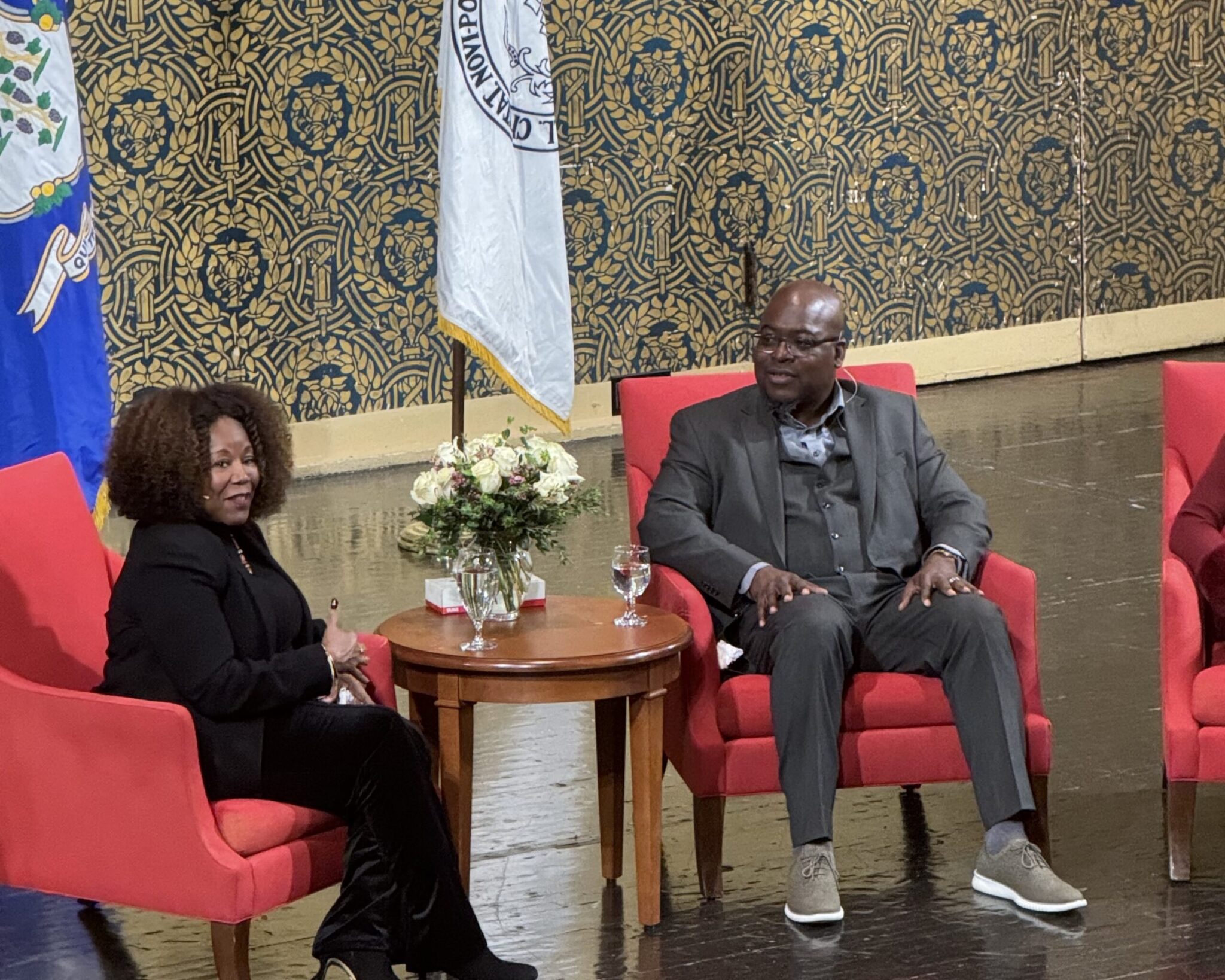Ruby Bridges addresses a packed Woolsey Hall for 2024 MLK Commemoration
In the second consecutive year of in-person MLK commemorations since the COVID-19 pandemic, Ruby Bridges discussed her personal experiences, highlighting the need for educational equality and breaking harmful cycles of hate.

Chris Tillen, Contributing Photographer
On Jan. 24, civil rights activist and author Ruby Bridges spoke to a packed Woolsey Hall, which was filled with students, faculty and members of the New Haven community in commemoration of the legacy of Dr. Martin Luther King Jr.
Bridges joined Stephanie Owusu ’24 and William Johnson, the director of educational strategy at the William Caspar Graustein Memorial Fund, onstage. On Nov. 14, 1960, Bridges became the first Black student to integrate into William Frantz Elementary, an all-white school in Louisiana.
At the event, Bridges shared accounts of her experiences and called on all in attendance to actively push toward combating barriers that divide people.
Risë Nelson, chair of Yale’s MLK Commemoration planning committee and director of diversity, equity, inclusion & accessibility of Yale University Library & Collections, introduced Bridges at the event.
“We couldn’t be happier to welcome Ms. Bridges to Yale,” Nelson said. “Her insights, coupled with the significance of the 70th anniversary of Brown v. Board of Education this year, promise to enrich our understanding and dedication to advancing educational justice.”
As attendees streamed into Woosley, they were met with a performance by Harmony in Action, Music Haven’s advanced student chamber orchestra. Composed of New Haven students, Harmony in Action performed several pieces including “Lift Every Voice and Sing,” a hymn that is often referred to as “the Black national anthem.”
Following the performance, members of the MLK planning committee Risha Chakraborty ’25 and Yasmeen Abed ’23 provided an opening introduction. Their remarks were followed by Nelson who dedicated the commemoration event to children and educators. Nelson’s remarks were followed by Kimberly Goff-Crews, secretary and vice president for student life, and University President Peter Salovey.
Before Stephen Shepherd ’27 welcomed Bridges, Owusu and Johnson to the stage, the a cappella group Shades of Yale performed a gospel rendition of “Amen/We Shall Overcome.”
Throughout the evening, Owusu posed questions to both Bridges and Johnson on the topic of educational equity and equality.
Bridges began by describing what education means to her, highlighting the ability education has to foster understanding and empathy. For Bridges’s parents, the chance for their daughter to attend William Frantz Elementary meant a chance for her to go to college and have a better life full of opportunities.
Bridges further discussed the sacrifice that her parents made when they agreed to send her to William Frantz Elementary School and emphasized that people still must fight for the opportunity of education.
Bridges then relayed her personal story, including her walk escorted by U.S marshals through a crowd of people protesting her attendance at the school. Bridges specifically emphasized that she felt protected by her childhood innocence, recalling that she was not initially aware of the racism when she began her first walk.
At six years old, Bridges remarked that the crowd of angry protesters initially felt like a New Orleans Mardi Gras parade.
Bridges told the story of meeting Barbara Henry, who was her teacher and who she calls her best friend to this day, within the school. At first impression, Henry, a white woman, looked exactly like the crowd of people outside, Bridges said. Yet, Bridges described the care Henry showed her. She said she felt that she could have a good day because of her relationship with Henry.
Bridges connected this story to the message of King and his famous words that one must judge a person based on their character and not the color of their skin.
Bridges then moved on to illustrate what she sees as the fight people are currently engaged in of good vs. evil, discussing how racism is only one of the “many tools” to divide us.
Bridges also described her first encounter with racism as the moment when a white child said he couldn’t play with her because his mom said so. This story introduced another one of Bridges’ central messages: how adults who impart knowledge to children can prolong the injustices of the past.
Johnson followed this by reflecting on his work in education, adding it is the responsibility of educators, parents and other adults to teach goodness.
In an interview with the News before this event, Owusu spoke on the power of the commemoration event and Bridges’ words.
“I remember, even in kindergarten, being taught that you can make change at this age just like Ruby Bridges did,” Owusu said.
Risha Chakraborty ’25 said that she appreciated the relevance of Bridges’ message in our currently “fraught world.” Chakraborty said she specifically took away an understanding of the innocence of children in relation to issues such as racism.
“I think she really wants everyone to realize the impact they have on shaping the younger generations of the world and commit to allowing our children to keep their innocence and fight for good for as long as possible,” Chakraborty said.
Following the discussion, Ward 1 Alder Kiana Flores ’25 presented Bridges with an official citation from the New Haven Board of Alders. Alpha Phi Alpha, the oldest intercollegiate historically African American fraternity, and the Yale Black Alumni Association gifted Bridges a crystal from New Haven and Yale.
Bridges closed out her responses with a central message on the need for good in today’s world.
“It is time for our movement, it is time for those of us who consider ourselves good to come together…we need each other.,” Bridges said. “That is my message.”
Last year, Dr. King’s eldest son Martin Luther King III spoke at the 2023 MLK commemoration in Woolsey Hall.







